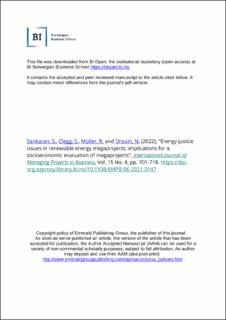Energy justice issues in renewable energy megaprojects: implications for a socioeconomic evaluation of megaprojects
Peer reviewed, Journal article
Accepted version
Permanent lenke
https://hdl.handle.net/11250/2997382Utgivelsesdato
2022Metadata
Vis full innførselSamlinger
- Scientific articles [2181]
Originalversjon
International Journal of Managing Projects in Business. 2022, 15 (4), 701-718. 10.1108/IJMPB-06-2021-0147Sammendrag
Global responses to sustainable development programs that are aimed at tackling climate change have a heightened necessity in the wake of Covid-19 and its impact on vulnerable populations. The UN Sustainable Development Goals to be achieved by 2030 are aimed at achieving a sustainable future for all. The goal of UN Sustainable Development Goal 7 (SDG 7) is to ensure access to affordable, reliable, and sustainable energy for all. Two major global initiatives to move to renewable energy are the use of solar and wind energy. Recent investments in large solar and wind farms fall into the definition of megaprojects not only because of the size of the investment but also the social and environmental issues they create. These large projects are projected to increase in the future and the impact of these projects on stakeholders is also likely to intensify. In this paper we identify stakeholder issues created by large scale solar and windfarms and compare them with issues arising from ‘traditional’ infrastructure megaprojects (transport, terminals etc.). We also raise issues about the impact of sustainable development megaprojects on the communities in which they are situated. While renewable electricity is viewed as a positive move towards sustainable development of essential infrastructure renewable energy megaprojects are also found to have social justice implications for marginalized populations.

